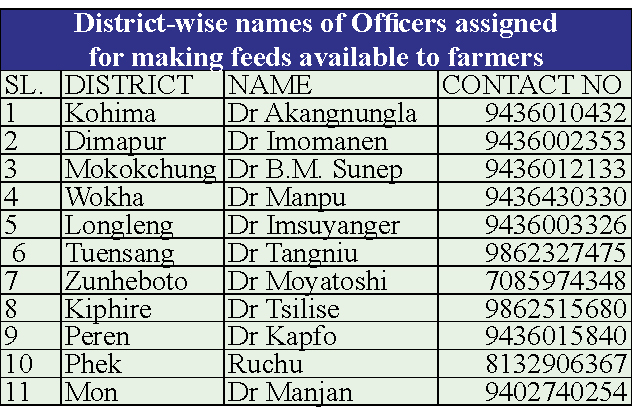Dept of AH&VS issues advisory

Kohima, April 20 (MExN): The Nagaland Animal Husbandry & Veterinary Services(AH&VS) Depatment today informed that a Task Force was formed to prepare an action plan based on the ongoing pandemic of COVID-19.
Accordingly, an advisory for the Veterinary Hospitals/ Dispensaries/ Health Centres/ Laboratories/ Livestock/ Poultry Farms/ Office Establishments/ Dairy Processing Plants and Public in General has been framed, it said.
As such, the department issued an advisory for consumers based on the World health Organisation’s recommendation for reducing animal-human transmission of emerging pathogens issued on March 26.
As per the advisory, clients visiting Veterinary health care facility have been directed to wear masks with clean clothing and advised not to enter inside of work facility. Only one attendant will be allowed to carry out OPD formality while maintaining social distancing.
Safety measures in animal markets
Anyone visiting, live animal markets, wet market, or animal product market should practise general hygiene measure, including regular hand washing with soap and water after touching animal and animal product, avoiding touching eye, nose, or mouth with hand, and avoiding contact with sick animal or spoiled animal product, it stated.
It also advised against contact with animal possibly living in the market (eg: - cat and dog, rodent, birds, bat) and stated that attention should be taken to avoid contact with potentially contaminated waste or fluid on the soil or structure of shop and market facilities.
The consumption of raw or undercook of animal product should be avoided and raw meat, milk, or animal organs should be handled with care to avoid cross contamination with uncooked food as per good food practise. It also view that door to door raw milk delivery by milkman is a potential threat for transmission of contamination.
Practices for animal handlers
For slaughter house workers, markets and those handling live animals and animal product, it advised good hygienic practices including frequent hand washing, wearing protective glove, head cover and apron while handling animal and fresh animal product. All protective clothing should be removed after work and washed and daily workers should avoid exposing family member to soiled work clothing, shoes or related items, it said.
Equipment including knife/Dao and working places should be disinfected frequently, before and after operation, it added.
As a general recommendation sick animals should never be slaughtered for consumption and dead animals should be safely buried or destroyed and contact with the body fluids should be avoided.
Any person engaged in delivery of fresh food of animal origin is advised to wear protective apron, head cover, masks and gloves besides dressing properly with clean clothing.
Additionally, the department advisory cited the ‘OIE advisory group on COVID-19 and the Animal-Human interface (April 7)’ and stated that laboratory experiments revealed that pigs, chickens and ducks did not appear to be susceptible to infection with the SARS-CoV-2 virus which causes COVID-19. However, cats, ferrets and dogs were found to be susceptible to experimental infection of various degrees.
It is highlighted that livestock species relevant for trade have not been proven to be susceptible to infection with SARS-CoV-2, it said.






